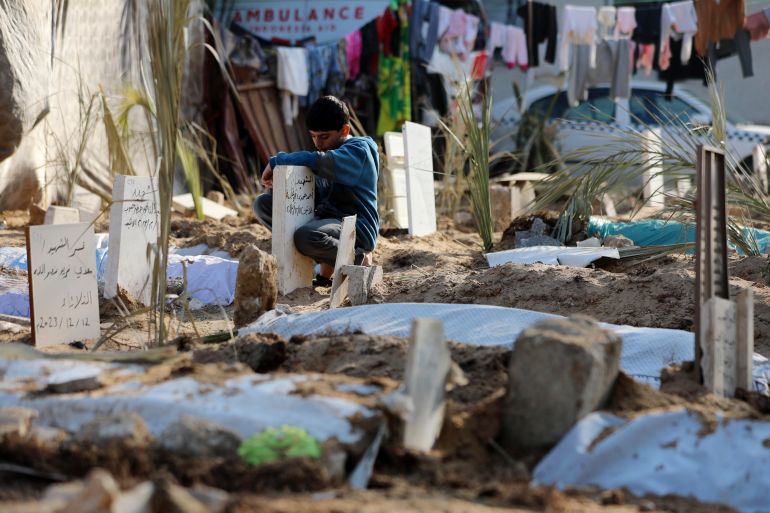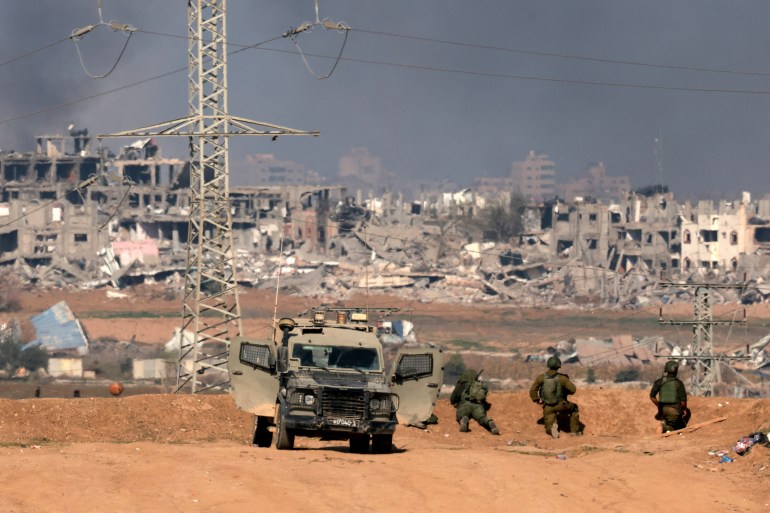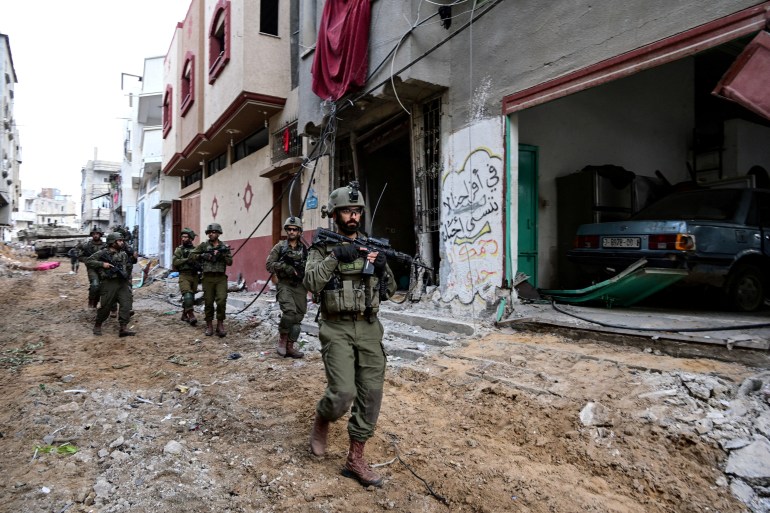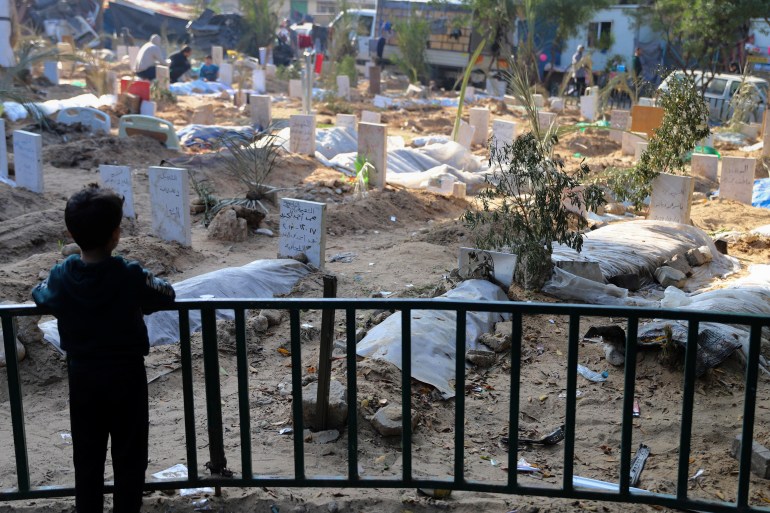‘He’s breathing’: My two hours under Gaza’s rubble after an Israeli strike
A father’s radio, a mother’s reassurance – and then, in an instant, darkness and pain. This is life under Israeli attack

Gaza City — On the morning that the unthinkable happened, my father was holding the radio close, hoping the news bulletin might bring some kind of relief such as news of a ceasefire. My mother was attempting to strike a reassuring tone following another long and sleepless night in our family home in central Gaza City.
“I am hopeful today shall pass peacefully, or at least be anything unlike last night,” she told us.
Keep reading
list of 4 itemsConfrontations between rival protesters at UCLA over Gaza war
Rafah rescue team uses pulley to retrieve man injured by Israeli attack
Israeli air strike destroys residential tower in Gaza
That morning – December 7 – after making contact with my news desk in Doha to let them know that we had survived the heavy overnight bombardment, I joined my 65-year-old father, Rafik, who was listening to the news.
None of us had any idea what was about to come.
It happened in a matter of milliseconds. In an instant, the morning’s bright sunshine disappeared, as the entire world turned dark and my two-year-old son, Rafik, my wife, Asmaa, father, mother, Nadia, and sister, Fatma, were all thrust into a black world of choking dust, smoke and fire.
Everything seemed to vanish. All I knew was that pain was coursing through my body and I was trapped under what I later learned was the weight of the ceiling pressed down upon my family and I.
In a panic, I screamed the names of my family one by one. Unable to see any of them, I prayed and cried that one of them would answer me.
None of them did.
A few moments later, I passed out.

Total confusion
Hours later, it was the voices that came first.
Muffled shouts of “He’s alive too!” that became, “He’s breathing!”. It didn’t matter to me. All I cared about was finding out if my family were safe.
“They are all OK, don’t worry about them,” a stranger assured me, trying to stop the flow of blood from my arms and my shattered fingers.
“Just, please, don’t make any effort to move – keep your head up,” he instructed as he searched my body for other injuries and wounds.
All I felt was absolute confusion. I couldn’t make any sense of what was happening. I didn’t understand who all these people were, or how we had been hit by an air strike that no one had heard coming. I couldn’t tell where my family were, or think clearly about what had happened.
I remember the explanations. It had been two hours since the house had been bombed. All that time, we had remained buried under the rubble, lying there as our neighbours struggled frantically to break through the cement walls of the house to reach us.
As I slowly started to grasp what had happened, the pain I was in seemed to intensify.
We had all sustained injuries during the air strike. I can remember my son, Rafik, screaming, his face matted with blood and dust as strangers tried to clean him up.
How we survived the bombing, the glass and the metal falling upon us as the two-storey building collapsed over our heads, I cannot tell. It still seems like a miracle.
But even though that air strike did not kill us, it destroyed something inside us. It wiped out any last remnants we had of normality and of life continuing. In one tiny instant, it planted the seeds of the mental wounds that we will carry through each day with us for a lifetime.

A week of unending agony
Our neighbours were able to give us immediate first aid, cleaning and bandaging our wounds. But there was nothing to alleviate the pain that now racked our bodies. No one had any illusions that accessing medical care would be straightforward.
Hospitals and medical facilities have been severely affected by the bombardments. A lack of adequate medical supplies has led to many of the injured later losing their lives to infection. Moving anywhere in northern Gaza brings the serious risk of being targeted by an Israeli sniper or being caught in a barrage of gunfire. Nevertheless, despite the orders from the Israeli forces to leave, this area remains home to hundreds of thousands of civilians, all of whom must endure these risks daily.
For six days, in the ruins of our home, we dreamed about finding painkillers – or something that would, at the very least, allow us to sleep.
There were none.
We were told that we had been lucky to survive the bombing. While that may be true, it offers little comfort during the night, when the pain from your injuries becomes indescribable, depriving you of sleep or any comfort.
Infection is a constant worry. Every time the first trace of contamination appears, the wounds have to be cleaned with scorching water, fluid so hot that it burns the healthy skin around the wound. It was difficult to get Rafik to understand that we weren’t trying to burn him. Still, despite the pain of the searing water being greater than that of any infection, he accepted it.
The alternative isn’t worth thinking about.
Fleeing in terror
One week passed and we started to notice some improvements in our health. All the while, the bombardment continued.
At about noon on December 14, our neighbourhood was subjected to an overwhelming air and artillery barrage. It was unbelievable and appeared entirely indiscriminate. Our neighbours were dying by the minute. Many more were injured.
When the Israeli troops arrived in the wake of the bombardment, those who could, fled for their lives – my family included. I can only describe that point in time as pure terror. Those who had been hit, or were injured as a result of the barrage, were left behind.
To stop and help was to die.
As we zigzagged through the streets amid crowds of terrified people, the pain from our wounds returned with a vengeance.

My wife, our terrified son in her arms, suggested we seek shelter in one of the schools run by the UN Relief and Works Agency for Palestine Refugees in the Near East (UNRWA), relatively far from the focus of the bombardments.
There, we joined thousands of others, all of whom spoke of having left scenes of death and carnage behind.
Now we are left with little to live off but the essentials. Food and medicines aren’t available.
There aren’t enough mattresses and blankets to protect against the night’s biting cold. Clean drinking water is a luxury, leaving people with nothing to drink but dirty water, increasing the chances of bacterial infection and stomach disease.
Children, pregnant women, the young and the elderly are all facing the same daily struggle: survival.
Life in this school is about waiting for death.
There is nothing more we can lose. We have lost friends, loved ones, colleagues, teachers and doctors. Everything – absolutely everything we had – is gone.
Even if the war comes to an end now, it will take years for us to start reclaiming something of what we have lost.
When we might again have somewhere we can call home, we have no idea.